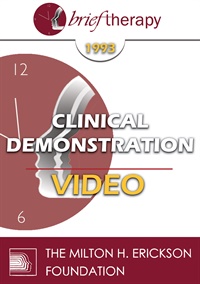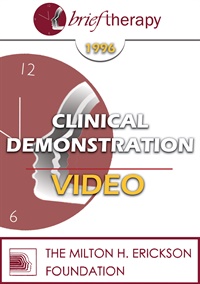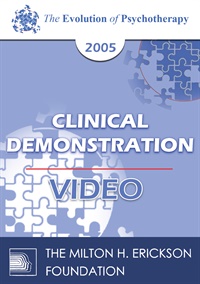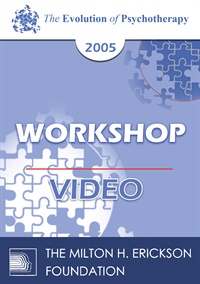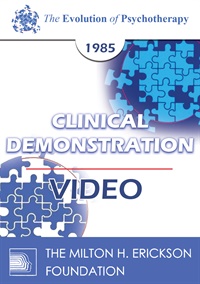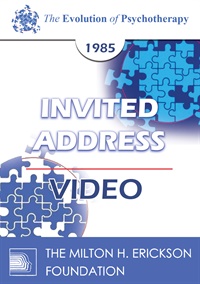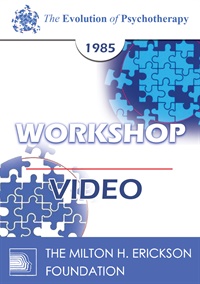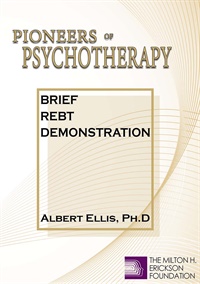
- Average Rating:
- Not yet rated
- Topic Areas:
- Clinical Demonstrations | Rational Emotive Behavior Therapy (REBT) | Anger | Humor | Psychotherapy
- Bundle(s):
- Pioneers of Psychotherapy Bundle
- Categories:
- Pioneers of Psychotherapy | Evolution of Psychotherapy | Evolution of Psychotherapy 2000
- Faculty:
- Albert Ellis, PhD
- Course Levels:
- Master Degree or Higher in Health-Related Field
- Duration:
- 00:51:00
- Format:
- Audio and Video
- Original Program Date:
- May 27, 2000
- Short Description:
- Albert Ellis (2000) demonstrates with two volunteers. The first volunteer is angry and intimidated by her supervisors. Humor and imagery are incorporated. The second volunteer feels a need to control others and is angry when she can’t. Ellis uses imagery to correct cognitive patterns and produce an emotional shift.
- Price:
- $59.00 - Base Price
Tags: REBT Humor Anger Psychotherapy Albert Ellis
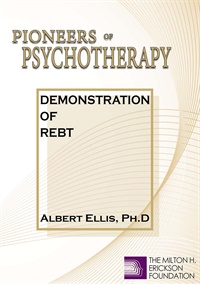
- Average Rating:
- Not yet rated
- Topic Areas:
- Clinical Demonstrations | Rational Emotive Behavior Therapy (REBT) | Homework | Humor
- Bundle(s):
- Pioneers of Psychotherapy Bundle
- Categories:
- Pioneers of Psychotherapy | Evolution of Psychotherapy | Evolution of Psychotherapy 1995
- Faculty:
- Albert Ellis, PhD
- Course Levels:
- Master Degree or Higher in Health-Related Field
- Duration:
- 01:01:00
- Format:
- Audio and Video
- Original Program Date:
- Dec 15, 1995
- Short Description:
- Ellis and Wolfe (1995) demonstrate with several volunteers. Beth, is troubled by her dominating mother. Ellis assigns a homework task. Next, Wolfe works with a volunteer who feels betrayed by her husband and brother. Ellis works with a second volunteer, Megan, who is ending a relationship with her boyfriend. Ellis uses imagery, confrontation and humor.
- Price:
- $59.00 - Base Price
Tags: Homework Humor REBT Albert Ellis

- Average Rating:
- Not yet rated
- Topic Areas:
- Clinical Demonstrations | Rational Emotive Behavior Therapy (REBT) | Brief Therapy
- Categories:
- Brief Therapy Conference | Brief Therapy Conference 2002
- Faculty:
- Albert Ellis, PhD
- Course Levels:
- Master Degree or Higher in Health-Related Field
- Duration:
- 43:55
- Format:
- Audio and Video
- Original Program Date:
- Dec 13, 2002
- Short Description:
- Educational Objectives: 1) To describe how to do REBT briefly. 2) To name three techniques that REBT includes.
- Price:
-
Sale is $29.00
price reduced from Base Price - $59.00
Tags: Albert Ellis Brief Therapy REBT
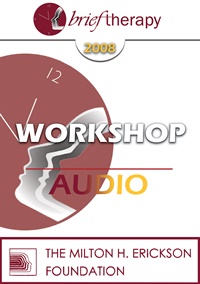
- Average Rating:
- Not yet rated
- Topic Areas:
- Workshops | Rational Emotive Behavior Therapy (REBT) | Brief Therapy
- Categories:
- Brief Therapy Conference | Brief Therapy Conference 2008
- Faculty:
- Debbie Joffe Ellis
- Duration:
- 2:55:05
- Format:
- Audio Only
- Original Program Date:
- Dec 14, 2008
- Short Description:
- This workshop will describe the main techniques and benefits of Rational Emotive Behavior Therapy (REBT), as well as discuss its efficiency and effectiveness as a brief therapy. Participants will learn important and helpful self-work to do after therapy. There will be live demonstrations with audience volunteers, and time for questions from participants.
- Price:
- $15.00 - Base Price
Tags: Brief Therapy REBT
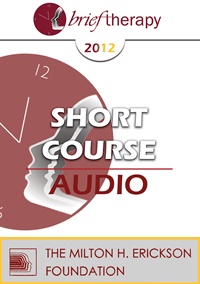
- Average Rating:
- Not yet rated
- Topic Areas:
- Short Courses | Rational Emotive Behavior Therapy (REBT)
- Categories:
- Brief Therapy Conference | Brief Therapy Conference 2012
- Faculty:
- Debbie Joffe Ellis
- Duration:
- 1:30:52
- Format:
- Audio Only
- Original Program Date:
- Dec 05, 2012
- Short Description:
- BT12 Short Course 18 – The Brief, Lasting and Vigorous Approach of Rational Emotive Behavior Therapy – Debbie Joffe Ellis, MDAM Rational Emotive Behavior Therapy (REBT) is a most effective, vigorous and compassionate approach. Many clients experience life-enhancing gains after REBT sessions, and the benefits last when the clients continues to practice the principles they are taught in therapy. In this course, attendees will learn the main principles, techniques and methods of REBT, observe a demonstration of the approach, observe its effectiveness as brief therapy, do exercises and have questions answered.
- Price:
- $15.00 - Base Price
Tags: REBT
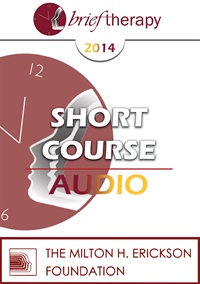
- Average Rating:
- Not yet rated
- Topic Areas:
- Anxiety | Depression | Trauma | Short Courses | Rational Emotive Behavior Therapy (REBT) | Pain and Healing | Brief Therapy
- Categories:
- Brief Therapy Conference | Brief Therapy Conference 2014
- Faculty:
- Debbie Joffe Ellis
- Duration:
- 1:31:16
- Format:
- Audio Only
- Original Program Date:
- Dec 11, 2014
- Short Description:
- Rational Emotive Behavior Therapy (REBT), the holistic approach considered to be the grandparent of cognitive approaches, created by the renowned and brilliant pioneer Albert Ellis PhD, is most effective as a brief therapy for lessening, transforming, healing and preventing emotional disturbances. This Short Course includes a live clinical demonstration, and present the main aspects, methods and techniques of this vigorous, bold and compassionate approach, and is presented by Debbie Joffe Ellis, wife of Albert Ellis.
- Price:
- $15.00 - Base Price
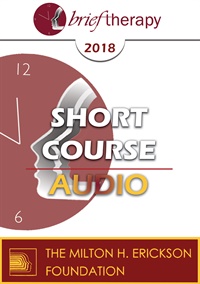
- Average Rating:
- Not yet rated
- Topic Areas:
- Short Courses | Addiction | Brief Therapy | Rational Emotive Behavior Therapy (REBT) | Solution Oriented Approach
- Categories:
- Brief Therapy Conference | Brief Therapy Conference 2018
- Faculty:
- JULIA ALPEROVICH, MS
- Duration:
- 1:25:51
- Format:
- Audio Only
- Original Program Date:
- Dec 06, 2018
- Short Description:
- This presentation will introduce a short-term model of treatment incorporating solution-focused, rational emotive behavioral, and systems theory interventions for residential or intensive outpatient drug and alcohol treatment.
- Price:
- $15.00 - Base Price
- Average Rating:
- Not yet rated
- Topic Areas:
- Clinical Demonstrations | Rational Emotive Behavior Therapy (REBT)
- Categories:
- Brief Therapy Conference | Brief Therapy Conference 1993
- Faculty:
- Albert Ellis, PhD | Janet Wolfe, PhD
- Course Levels:
- Master Degree or Higher in Health-Related Field
- Duration:
- 51:44
- Format:
- Audio and Video
- Original Program Date:
- Dec 10, 1993
- Short Description:
- BT93 Clinical Demonstration 03 - Demonstration of Rational-Emotive Brief Therapy - Albert Ellis, PhD & Janet Wolfe, PhD
- Price:
-
Sale is $29.00
price reduced from Base Price - $59.00
- Average Rating:
- Not yet rated
- Topic Areas:
- Clinical Demonstrations | Rational Emotive Behavior Therapy (REBT)
- Categories:
- Brief Therapy Conference | Brief Therapy Conference 1996
- Faculty:
- Albert Ellis, PhD
- Course Levels:
- Master Degree or Higher in Health-Related Field
- Duration:
- 54:02
- Format:
- Audio and Video
- Original Program Date:
- Dec 13, 1996
- Short Description:
- BT96 Clinical Demonstration 07 - Demonstration of Brief Rational Emotive Behavior Therapy - Albert Ellis , PhD
- Price:
-
Sale is $29.00
price reduced from Base Price - $59.00
- Average Rating:
- Not yet rated
- Topic Areas:
- Clinical Demonstrations | Rational Emotive Behavior Therapy (REBT) | Brief Therapy | Psychotherapy
- Categories:
- Evolution of Psychotherapy | Evolution of Psychotherapy 2005
- Faculty:
- Albert Ellis, PhD
- Course Levels:
- Master Degree or Higher in Health-Related Field
- Duration:
- 43:40
- Format:
- Audio and Video
- Original Program Date:
- Dec 09, 2005
- Short Description:
- Educational Objectives: To list three techniques of REBT. To list three advantages of REBT.
- Price:
-
Sale is $29.00
price reduced from Base Price - $59.00
- Average Rating:
- Not yet rated
- Topic Areas:
- State of the Art Address | Rational Emotive Behavior Therapy (REBT) | Brief Therapy | Psychotherapy | Therapist Development
- Categories:
- Evolution of Psychotherapy | Evolution of Psychotherapy 2005
- Faculty:
- Albert Ellis, PhD
- Course Levels:
- Master Degree or Higher in Health-Related Field
- Duration:
- 57:01
- Format:
- Audio and Video
- Original Program Date:
- Dec 11, 2005
- Short Description:
- Dr. Ellis will describe the up-to-date principles and practice of Rational Emotive Behavior Therapy (REBT) in the twenty-first century, how some people are trying to water it down, and what its future will probably be.
- Price:
-
Sale is $29.00
price reduced from Base Price - $59.00
- Average Rating:
- Not yet rated
- Topic Areas:
- Workshops | Rational Emotive Behavior Therapy (REBT) | Psychotherapy | Love | Relationships | Sex and Sexuality
- Categories:
- Evolution of Psychotherapy | Evolution of Psychotherapy 2005
- Faculty:
- Albert Ellis, PhD
- Course Levels:
- Master Degree or Higher in Health-Related Field
- Duration:
- 2:10:28
- Format:
- Audio and Video
- Original Program Date:
- Dec 07, 2005
- Short Description:
- Dr. Ellis will present cognitive, emotional and behavioral techniques to help men and women in their sex, love and marital relationships. He also will include therapy helping their interpersonal relationships in work situations.
- Price:
-
Sale is $29.00
price reduced from Base Price - $59.00
- Average Rating:
- Not yet rated
- Topic Areas:
- Clinical Presentations | Rational Emotive Behavior Therapy (REBT) | Psychotherapy
- Categories:
- Evolution of Psychotherapy | Evolution of Psychotherapy 1985
- Faculty:
- Albert Ellis, PhD
- Course Levels:
- Master Degree or Higher in Health-Related Field
- Duration:
- 55:03
- Format:
- Audio and Video
- Original Program Date:
- Dec 14, 1985
- Short Description:
- Clinical Presentation 20 - Workshop on Rational-Emotive Therapy Techniques featuring Albert Ellis, PhD.
- Price:
-
Sale is $29.00
price reduced from Base Price - $59.00
Tags: Psychotherapy REBT Albert Ellis
- Average Rating:
- Not yet rated
- Topic Areas:
- Invited Addresses | Cognitive Behavior Therapy (CBT) | Rational Emotive Behavior Therapy (REBT) | Psychotherapy
- Categories:
- Evolution of Psychotherapy | Evolution of Psychotherapy 1985
- Faculty:
- Albert Ellis, PhD | Mary Goulding, MSW
- Course Levels:
- Master Degree or Higher in Health-Related Field
- Duration:
- 1:26:48
- Format:
- Audio and Video
- Original Program Date:
- Dec 15, 1985
- Short Description:
- Invited Address Session 13 - Part 1 - The Evolution of Rational-Emotive Therapy (RET) and Cognitive Behavior Therapy (CBT) featuring Albert Ellis, PhD. With discussant Mary M Goulding, MSW. Moderated by Aaron H Canter, PhD.
- Price:
-
Sale is $29.00
price reduced from Base Price - $59.00
- Average Rating:
- Not yet rated
- Topic Areas:
- Workshops | Rational Emotive Behavior Therapy (REBT) | Psychotherapy
- Categories:
- Evolution of Psychotherapy | Evolution of Psychotherapy 1985
- Faculty:
- Albert Ellis, PhD
- Course Levels:
- Master Degree or Higher in Health-Related Field
- Duration:
- 2:59:13
- Format:
- Audio and Video
- Original Program Date:
- Dec 14, 1985
- Short Description:
- This workshop presents the main techniques of rational-emotive therapy (RET). Live demonstrations will be used to show how techniques are applied.
- Price:
-
Sale is $29.00
price reduced from Base Price - $59.00
Tags: Psychotherapy REBT
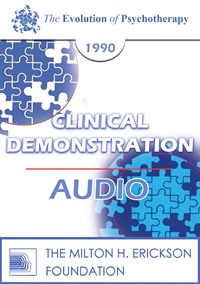
- Average Rating:
- Not yet rated
- Topic Areas:
- Clinical Presentations | Rational Emotive Behavior Therapy (REBT) | Psychotherapy
- Categories:
- Evolution of Psychotherapy | Evolution of Psychotherapy 1990
- Faculty:
- Albert Ellis, PhD
- Duration:
- 1 Hour
- Format:
- Audio Only
- Original Program Date:
- Dec 13, 1990
- Short Description:
- Educational Objectives: To be able to describe some of the main techniques of Rational-Emotive Therapy To be able to experiment with the use of some of these techniques
- Price:
- $15.00 - Base Price
Tags: Psychotherapy REBT Albert Ellis
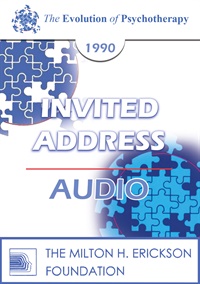
- Average Rating:
- Not yet rated
- Topic Areas:
- Invited Addresses | Rational Emotive Behavior Therapy (REBT) | Belief Systems | Cognitive Behavior Therapy (CBT) | Psychotherapy
- Categories:
- Evolution of Psychotherapy | Evolution of Psychotherapy 1990
- Faculty:
- Albert Ellis, PhD | Salvador Minuchin, MD
- Duration:
- 1 Hour 28 Minutes
- Format:
- Audio Only
- Original Program Date:
- Dec 14, 1990
- Short Description:
- This revision of the original ABCs of RET and cognitive-behavior therapy shows that people's Belief System (B) about their Activating Events (A) of their lives largely contribute to their emotional and behavioral Consequences (C) but that A, B, and C importantly influence and include each other and that all three include interacting cognitive, emotive, and behavioral elements.
- Price:
- $15.00 - Base Price
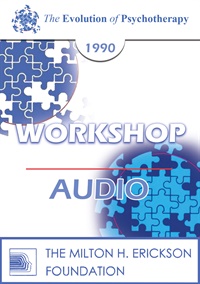
- Average Rating:
- Not yet rated
- Topic Areas:
- Workshops | Rational Emotive Behavior Therapy (REBT) | Psychotherapy
- Categories:
- Evolution of Psychotherapy | Evolution of Psychotherapy 1990
- Faculty:
- Albert Ellis, PhD
- Duration:
- 2 Hours 50 Minutes
- Format:
- Audio Only
- Original Program Date:
- Dec 12, 1990
- Short Description:
- Workshop 01 from the Evolution of Psychotherapy 1990 - Rational Emotive Therapy (RET), featuring Albert Ellis, PhD. The main principles and most popular techniques of rational-emotive therapy will be presented and discussed. There will be live demonstrations with volunteers from the audience.
- Price:
- $15.00 - Base Price
Tags: Psychotherapy REBT Albert Ellis
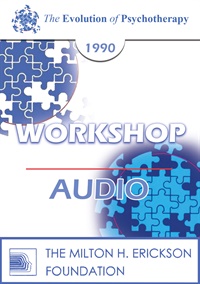
- Average Rating:
- Not yet rated
- Topic Areas:
- Workshops | Rational Emotive Behavior Therapy (REBT) | Psychotherapy | Relationships
- Categories:
- Evolution of Psychotherapy | Evolution of Psychotherapy 1990
- Faculty:
- Albert Ellis, PhD
- Duration:
- 2 Hours 31 Minutes
- Format:
- Audio Only
- Original Program Date:
- Dec 15, 1990
- Short Description:
- This workshop will present cognitive, experiential, and behavioral techniques for helping men and women to realize more of their human potential. There will be special emphasis on personal and work-related male/female relationships and on how to deal with negative reactions to "out of role'' behavior, such as women's assertiveness and men's expressions of intimacy. Live demonstrations will be offered.
- Price:
- $15.00 - Base Price

- Average Rating:
- Not yet rated
- Topic Areas:
- Clinical Demonstrations | Rational Emotive Behavior Therapy (REBT) | Psychotherapy
- Categories:
- Evolution of Psychotherapy | Evolution of Psychotherapy 1995
- Faculty:
- Albert Ellis, PhD
- Duration:
- 58 Minutes
- Format:
- Audio Only
- Original Program Date:
- Dec 16, 1995
- Short Description:
- Educational Objectives: To list three of the main techniques of Rational Emotive Behavior Therapy (REBT). To experiment with some of these techniques.
- Price:
- $15.00 - Base Price
Tags: Psychotherapy REBT Albert Ellis
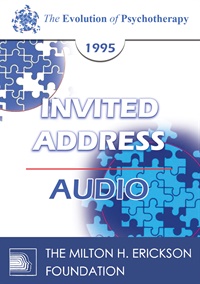
- Average Rating:
- Not yet rated
- Topic Areas:
- Invited Addresses | Rational Emotive Behavior Therapy (REBT) | History of Psychotherapy | Psychotherapy
- Categories:
- Evolution of Psychotherapy | Evolution of Psychotherapy 1995
- Faculty:
- Albert Ellis, PhD | Aaron Beck, MD
- Duration:
- 1 Hour 19 Minutes
- Format:
- Audio Only
- Original Program Date:
- Dec 13, 1995
- Short Description:
- My own physical disabilities as well as my performance anxiety during my childhood and adolescence impelled me to read many ancient and modern philosophers who had worked on the philosophy of human happiness and unhappiness. Thinking about their views and adapting them to my own life, I made myself distinctly less disturbed as well as less disturbable.
- Price:
- $15.00 - Base Price
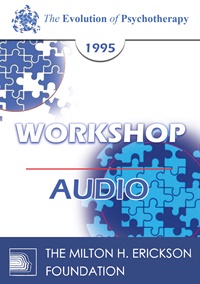
- Average Rating:
- Not yet rated
- Topic Areas:
- Workshops | Rational Emotive Behavior Therapy (REBT) | Psychotherapy
- Categories:
- Evolution of Psychotherapy | Evolution of Psychotherapy 1995
- Faculty:
- Albert Ellis, PhD
- Duration:
- 2 Hours 39 Minutes
- Format:
- Audio Only
- Original Program Date:
- Dec 14, 1995
- Short Description:
- The main principles and most popular techniques of Rational Emotive Behavior Therapy (REBT) will be presented and detailed. There will be live demonstrations with volunteers from the audience.
- Price:
- $15.00 - Base Price
Tags: Psychotherapy REBT Albert Ellis
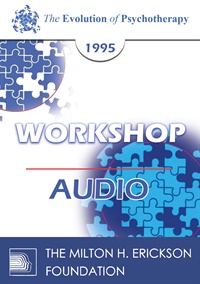
- Average Rating:
- Not yet rated
- Topic Areas:
- Workshops | Rational Emotive Behavior Therapy (REBT) | Intimacy | Psychotherapy | Relationships
- Categories:
- Evolution of Psychotherapy | Evolution of Psychotherapy 1995
- Faculty:
- Albert Ellis, PhD
- Duration:
- 2 Hours 44 Minutes
- Format:
- Audio Only
- Original Program Date:
- Dec 16, 1995
- Short Description:
- This workshop will present cognitive experiential and behavioral techniques to help women and men in their intimate relationships. There will be a special emphasis on personal and work-related male/female relationships and how to deal with negative reactions to "out of role" behavior, such as women's assertiveness and men's expressions of intimacy. Live demonstrations will be offered.
- Price:
- $15.00 - Base Price
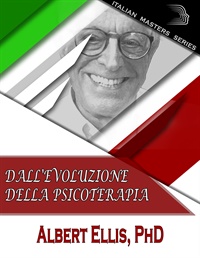
- Average Rating:
- Not yet rated
- Topic Areas:
- Rational Emotive Behavior Therapy (REBT)
- Categories:
- Italian | World Languages
- Faculty:
- Albert Ellis, PhD
- Duration:
- 51 Minutes
- Format:
- Audio and Video
- Original Program Date:
- Sep 24, 2019
- Short Description:
- Albert Ellis (2000) dimostra con due volontari. La prima volontaria è arrabbiata e intimidita dai suoi supervisori. Umorismo e immagini sono incorporati. La seconda volontaria sente il bisogno di controllare gli altri ed è arrabbiata quando non può. Ellis usa le immagini per correggere i modelli cognitivi e produrre un cambiamento emotivo.
- Price:
- $59.00 - Base Price


